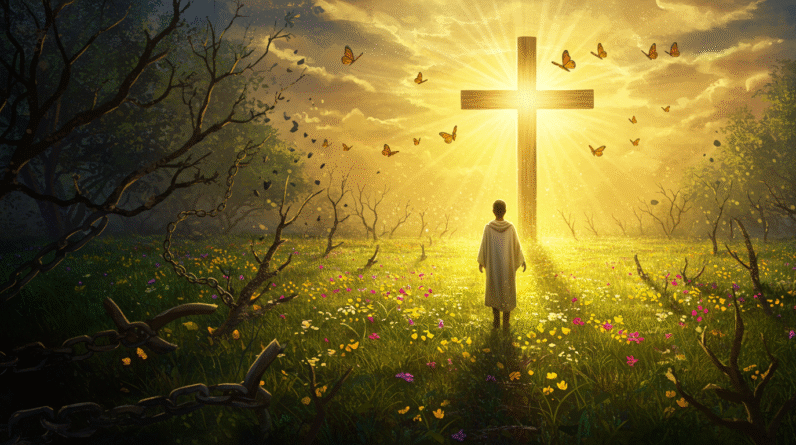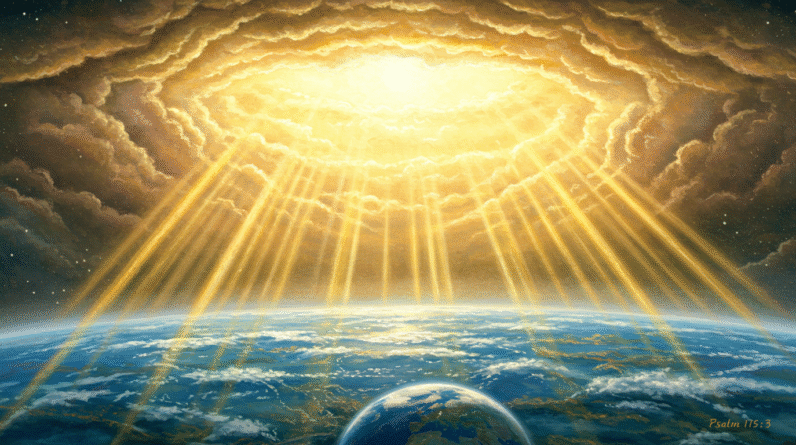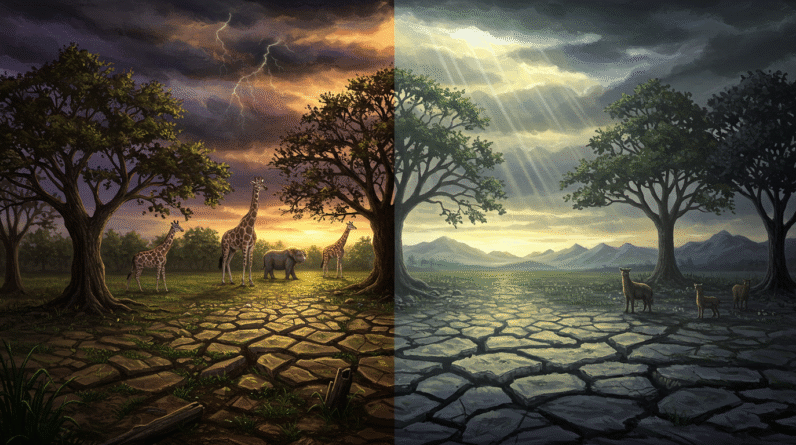The Promise Of A New Heaven And Earth (Revelation 21:1)
You have read the words that fell like a fresh hope into the hearts of the first Christians and they still resound for you today: “Then I saw ‘a new heaven and a new earth.'” (Revelation 21:1). Those words announce a divine promise that ties the whole story of Scripture together — from the first moment God spoke light into being to the future when God makes all things new. As someone who wants to understand God as Creator and to live in the light of that truth, you’ll find in this promise both comfort for your present struggles and a holy summons to hope and obedience.
Why this promise matters for you
When life is full of brokenness — illness, loss, injustice, the weariness of everyday sin — it’s easy to imagine that God’s work is only about forgiveness and personal salvation. But the promise of a new heaven and earth tells you that God’s redemption is cosmic. It involves the whole of creation, not just individual souls. It assures you that the Creator who formed the stars also intends to renew the very fabric of existence. This truth reshapes how you view suffering, vocation, and the world you inhabit.
God the Creator from Genesis to Revelation
You cannot grasp the promise of a new heaven and earth without first seeing God as Creator. The Bible begins with a clear affirmation: “In the beginning God created the heavens and the earth.” (Genesis 1:1). That opening sentence sets the tone for everything that follows — God as Originator, Sustainer, and Purpose-Giver.
Throughout Scripture, God’s creative work is not merely a background fact; it is the foundation of covenant promises, worship, and mission. The Creator is the one who forms humankind in His image, gives people a place in creation, and entrusts them with stewardship. When you see God as Creator, you also see yourself as part of a divinely ordered reality that bears God’s fingerprints and is headed toward a divine destiny.
Creation’s Purpose: God’s Glory and Humanity’s Place
Creation was never meant to be aimless. From the very start, God’s creative acts reveal His glory: the heavens declare it, and the earth displays His handiwork. You are living within a world made to point to God’s wisdom, beauty, and holiness. Paul explains how all things were created through and for Christ: “For in him all things were created: things in heaven and on earth, visible and invisible…” (Colossians 1:16-17). That means the created order has intrinsic value because it belongs to the Lord.
Your dignity and purpose flow from this truth. You are called to reflect God, to care for what He has made, and to live as an ambassador of His reign. The promise of a new heaven and earth is not a negation of creation’s goodness; rather, it is the final fulfillment of its original purpose — a restoration and elevation in which God’s glory is fully revealed and you are invited into deeper intimacy with Him.
Brokenness: The Fall and the Groaning of Creation
You know that things are not as they should be. The story of Genesis records the rupture of the original harmony when sin entered the world, bringing death and futility: “To Adam he said, ‘Because you listened to your wife and ate from the tree about which I commanded you, “You must not eat from it,” cursed is the ground because of you…'” (Genesis 3:17-19). The effects were not limited to human relationships; the whole creation was affected.
Paul speaks of creation itself as groaning — longing for liberation from decay: “For the creation waits in eager expectation for the children of God to be revealed… the creation itself will be liberated from its bondage to decay and brought into the freedom and glory of the children of God.” (Romans 8:19-23). When you face suffering, wonder at the fragility of life, or mourn environmental loss, remember that the Bible recognizes this groaning and points to a future in which that groaning will end.
Prophets Foretold Renewal: Isaiah and Ezekiel
Long before Revelation, the prophets pointed to God’s plan to renew what was broken. Isaiah, speaking for God, announced a future that would make the world both familiar and gloriously new: “See, I will create new heavens and a new earth. The former things will not be remembered, nor will they come to mind.” (Isaiah 65:17). This is not a fantasy detached from history; it’s a promise grounded in God’s faithful intention to restore His creation.
Ezekiel’s prophecies also point to renewed covenant life where God gives His people a new heart and a new spirit: “I will give you a new heart and put a new spirit in you; I will remove from you your heart of stone…” (Ezekiel 36:24-28). When you read these prophetic promises, you find a thread connecting God’s work of redemption in human hearts with His commitment to remake the order of creation.
The New Covenant and New Creation in Jesus
Jesus is the hinge of history. The new covenant He inaugurates is not merely legal; it is ontological — it makes new what was broken. Paul plainly states the revolutionary nature of being “in Christ”: “Therefore, if anyone is in Christ, the new creation has come: The old has gone, the new is here!” (2 Corinthians 5:17). In Christ, renewal begins now and stretches into the eschatological promise of Revelation.
Jesus’ resurrection is the firstfruits of what God will accomplish for all creation. The writer of Hebrews points your eyes to Abraham and the faithful who looked forward to a city with foundations, “whose architect and builder is God.” (Hebrews 11:10). The resurrection reveals that death will not have the final word, and the promise of a new heaven and earth is the consummation of that victory.
Revelation 21:1 in Context
When you read Revelation 21, you must situate John’s vision within the larger sweep of Scripture. John writes, “Then I saw ‘a new heaven and a new earth,’ for the first heaven and the first earth had passed away, and there was no longer any sea.” (Revelation 21:1). These words are not a poetic escape hatch; they are a sober proclamation of God’s restorative action — a closure to the history of sin’s dominance and an opening to a renewed creation.
The surrounding verses make clear what this newness means: God dwells with His people, wiping away every tear, and there is no more death or mourning or crying or pain. “He will wipe every tear from their eyes. There will be no more death or mourning or crying or pain…” (Revelation 21:3-4). John’s vision is pastoral language for a cosmic reality: the Creator comes to make His home among you, and all the effects of the Fall are undone.
The meaning of “new heaven and new earth”
The “new heaven and new earth” phrase is rich with theological resonance. It isn’t merely a fresh coat of paint. The prophets already announced a radical renovation of history. Isaiah said it would be so, and John sees the culmination. For you, “new” signals continuity and transformation: the good of God’s original creation is honored, yet it is purified, perfected, and elevated. The old patterns of decay and sin are not merely patched; they are addressed at the root.
A breathtaking biblical scene of the New Heaven and New Earth. The old world fades into the background—stormy seas and dark skies—while before the viewer rises a renewed creation: crystal-clear rivers, lush landscapes, and a shining New Jerusalem descending from heaven. The sky glows with golden and sapphire light, filled with peace and majesty. The atmosphere radiates eternal hope and restoration, inspired by Revelation 21:1: “Then I saw a new heaven and a new earth, for the first heaven and the first earth had passed away.”

A City, Not Just a Replacement: The New Jerusalem
John’s vision takes on a tangible form: “I saw the Holy City, the new Jerusalem, coming down out of heaven from God” (Revelation 21:2). This is no abstract principle; it’s a description that ties the renewed cosmos to the dwelling of God with His people. The imagery of a city suggests order, community, and safety. It promises you a place where God’s rule is visible and where the redeemed gather.
The New Jerusalem also emphasizes beauty, holiness, and accessibility. The city’s gates are never shut, and nothing impure will enter it. “I did not see a temple in the city, because the Lord God Almighty and the Lamb are its temple.” (Revelation 21:22). For you, that means that the place where God is worshipped is not distant; God’s presence fills the renewed order. Worship and daily life are united under God’s direct reign.
Death, Sorrow, and Pain No More
One of the most consoling promises you’ll find is the abolition of death and suffering. John hears the voice proclaiming the removal of all that breaks your heart: “He will wipe every tear from their eyes. There will be no more death or mourning or crying or pain” (Revelation 21:4). This is not vague comfort; it’s a concrete reversal of the effects of sin.
You may be carrying grief today — for a loved one, for missed dreams, for the weight of injustice. The promise of a new heaven and earth does not trivialize your pain. It enters into it with full assurance that one day the Lord Himself will put all things right. This hope allows you to grieve honestly and to persevere faithfully, trusting that the God who authored creation will finish the work He began.
Theological Implications: Continuity and Discontinuity with Creation
As you wrestle with the idea of a new creation, you’ll meet two important theological truths: continuity and discontinuity. There is continuity because God’s character and purpose remain the same. The new creation fulfills what God intended at the beginning; it is not a replacement that discards God’s original goodness. Psalm 102 affirms that the Lord is eternal and that His purposes endure: “In the beginning you laid the foundations of the earth, and the heavens are the work of your hands.” (Psalm 102:25-27). God remains Creator and Sustainer.
There is discontinuity because sin introduced corruption that requires a decisive divine remedy. The suffering, injustice, decay, and death you see will not be simply reformed; they will be removed and healed. The new creation inaugurates a qualitatively different reality where God’s will is fully realized. When you hold both continuity and discontinuity together, you gain a balanced hope — one that honors the present world but looks past its brokenness to God’s ultimate transformation.
Practical Hope for Your Life Today
How does this grand vision shape your daily life? First, it gives you hope in suffering. The apostle Peter reminds you that God is preparing something beyond human imagining: “But in keeping with his promise we are looking forward to a new heaven and a new earth, where righteousness dwells.” (2 Peter 3:13). This hope does not remove the struggle, but it colors it with meaning. You learn to endure with patience because you know God is working toward a final and glorious outcome.
Second, it fuels your mission. If God is going to make all things new, then the gospel you proclaim is not only about saving souls from hell; it is about inviting people into the renewal of all things under Christ. Your work, whether in the marketplace, home, or church, participates in God’s restorative purpose when done for His glory.
Third, it shapes your stewardship. Because creation belongs to God, your care for the environment, for just structures, and for the poor flows from worship. You bear responsibility now for the well-being of God’s world, not as ultimate owners but as faithful stewards preparing for the day of consummation.
Living as Citizens of the New Creation
You are called to live as a citizen of the kingdom that is both “already” and “not yet.” Philippians reminds you that your citizenship is in heaven: “But our citizenship is in heaven. And we eagerly await a Savior from there, the Lord Jesus Christ…” (Philippians 3:20-21). That heavenly citizenship molds your identity and priorities here on earth.
This means cultivating gentleness, justice, and holiness in all your dealings. It means peacemaking, compassion for the marginalized, and a persistent commitment to truth. Living as a new-creation citizen is not about escape but engagement — bringing the values of the kingdom into your neighborhood, workplace, and family.
Creation Care as Worship and Witness
Your treatment of creation is deeply theological. God placed humanity in the garden to “work it and take care of it.” (Genesis 2:15). That was a sacred trust, and it remains part of your calling. Caring for the earth is not merely an environmental impulse; it is an act of worship that honors the Creator and models the renewal God intends.
When you care for creation, you witness to a watching world that God values what He has made. Stewardship becomes a proclamation that God’s redemption applies to the whole cosmos. In practical terms, this can mean reducing waste, advocating for the poor who are disproportionately affected by environmental harm, and encouraging sustainable practices that reflect God’s concern for future generations.
How This Shapes Your Worship and Evangelism
The promise of a new heaven and earth deepens your worship because it shifts your perspective from present troubles to eternal realities. Your hymns, prayers, and liturgies can echo the biblical hope — songs of lament that lead to praise, petitions that trust God’s coming restoration, and affirmations of God’s sovereignty over history. Worship that remembers creation’s Creator is worship that lives in expectation.
In evangelism, the new-creation promise broadens your proclamation. You are inviting people not only to forgiveness but to participation in God’s reshaping of the world. The gospel is good news for sinners and creation alike. When you tell someone about Christ, you are also telling them about a future where justice, beauty, and peace prevail forever.
How to Respond: Repentance, Faith, and Perseverance
Your appropriate response to God’s promise is simple and profound: repent, believe, and endure. The apostles preached repentance as the gateway to new life: “Peter replied, ‘Repent and be baptized, every one of you, in the name of Jesus Christ for the forgiveness of your sins…'” (Acts 2:38). Repentance is the turning away from patterns that fracture your relationship with God and creation.
Faith receives the gift of new life: “If you declare with your mouth, ‘Jesus is Lord,’ and believe in your heart that God raised him from the dead, you will be saved.” (Romans 10:9-10. That salvation is not merely a ticket out of the world; it is an invitation to live as a signpost pointing toward God’s final work.
And perseverance matters. The Christian life is a race that requires endurance, shaped by the promise that God will finish what He has started: “For the creation waits in eager expectation…” (Romans 8:19-23). Keep your eyes on the prize, continue in holiness, and trust God’s timing even when it seems slow.
The Promise in Pastoral Comfort
Like Billy Graham used to do, let me speak plainly: when you stare into the face of pain, you need a hope that is more than a platitude. Revelation offers that hope. It assures you that the Lord who began a good work will see it through. Psalm 102 and the prophets remind you that God is unchanging in His purpose and able to fulfill His promises (Psalm 102:25-27; Isaiah 66:22). Let that truth steady your heart as you face trials.
When you hold this promise close, you can grieve without despair, labor without cynicism, and love without counting the cost. The new heaven and new earth are God’s final “yes” to creation — and that “yes” includes you.
The Urgency of the Gospel in Light of the New Creation
The promise of the new creation brings both comfort and urgency. Comfort, because you know the end; urgency, because the means by which people enter that end is faith in Christ. The gospel calls people out of the present age into the reign of God, and that call is time-sensitive. Biblical preaching has always linked the present mission to future consummation, urging people to repent and believe.
You have a role in that mission. Whether through prayer, witness, service, or generosity, you participate in the advance of God’s kingdom. Your engagement matters. The promise of a new heaven and earth is a motivation for evangelism: the world to come is worth inviting everyone to share.
A Final Word of Hope
If you are discouraged, remember this: the story of Scripture moves from a good creation, through a fallen world, to a redeemed people and a renewed cosmos. The Lord who spoke everything into existence will not abandon His handiwork. He is faithful. Paul assures you that creation waits for freedom, and John closes the canon with the vision of God dwelling among His people (Romans 8:19-23; Revelation 21:3-4). Let this hope sink into your bones. It shapes your worship, your work, and your witness.
A simple prayer for your heart
Lord God, Creator and Redeemer, help you to live as one who belongs to the new creation. Give you strength to endure, a heart to love, and courage to share the good news. Let His presence comfort your grief, His justice guide your actions, and His hope sustain your faith. Amen.
Explore More
For further reading and encouragement, check out these posts:
👉 7 Bible Verses About Faith in Hard Times
👉 Job’s Faith: What We Can Learn From His Trials
👉 How To Trust God When Everything Falls Apart
👉 Why God Allows Suffering – A Biblical Perspective
👉 Faith Over Fear: How To Stand Strong In Uncertain Seasons
👉 How To Encourage Someone Struggling With Their Faith
👉 5 Prayers for Strength When You’re Feeling Weak

📘 Jesus and the Woman Caught in Adultery – Grace and Mercy Over Judgement
A powerful retelling of John 8:1-11. This book brings to life the depth of forgiveness, mercy, and God’s unwavering love.
👉 Check it now on Amazon
As a ClickBank & Amazon Affiliate, I earn from qualifying purchases.
Acknowledgment: All Bible verses referenced in this article were accessed via Bible Gateway (or Bible Hub).
“Want to explore more? Check out our latest post on Why Jesus? and discover the life-changing truth of the Gospel!”








